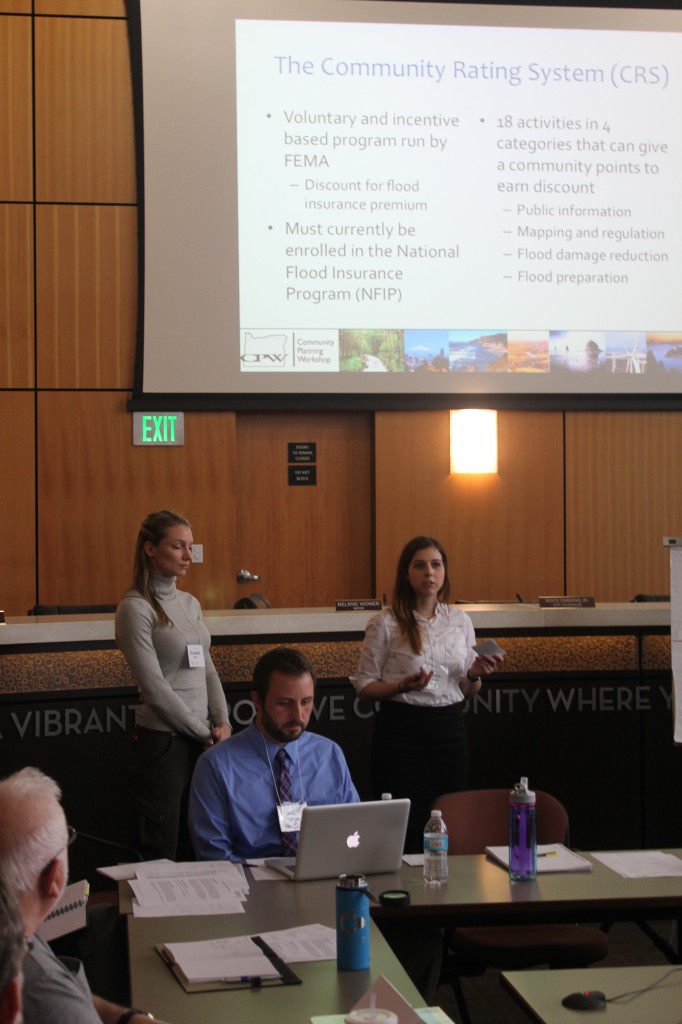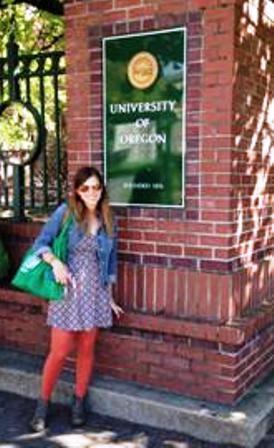Where were you born and where do you call home? I was born in Winfield, Illinois, but I’ve lived in Geneva, a Chicago suburb, for most of my life. I went to college at DePaul University, and now call Chicago home.
What’s your favorite pig-out food? My favorite pig-out food would have to be pizza (I mean, I am from Chicago).
In which graduate program are you enrolled? I’m enrolled in the Community and Regional Planning graduate program. I started out very specific and originally wanted to focus on environmental planning; however, now I’m more interested in land use planning in general.
Dream Job? If I weren’t going into planning, I’d love to be a pastry chef and one day, open my own bakery. For those who don’t know me, I’m pretty obsessed with desserts, and learning how to make them. I studied abroad in Paris, and since then, have wanted to learn how to make desserts as good as the ones I had in France!
2014 CPW Project – I worked on the Madras Hazards Plan Integration Project during the Community Planning Workshop (CPW) classes. For this project, my team and I worked to integrate the Jefferson County Natural Hazard Mitigation Plan, a non-regulatory document, with Madras’ comprehensive plan, a regulatory document. The final deliverable was a revised natural hazards chapter for the Madras’ comprehensive plan. The revised chapter is important because it not only fulfills Goal 7 of Oregon’s statewide planning goals, but it is also one tool that City of Madras can use to better prepare for natural hazards. My team’s role was to research best practices, gather public input, and create the revised chapter as well as natural hazard educational materials for residents of Madras.
What are the most critical skill(s) you learned from being engaged in CPW this past year – One of the most critical skills I learned from CPW this past year is how to communicate more effectively. In CPW I learned a lot about facilitating meetings and presenting information clearly and to various audiences, whether it be a world café style open house, or more formal presentation in front of the planning commission. CPW emphasizes the feedback process, so it was really helpful to run through presentations in front of the class to hear what I could do better, or what worked/ didn’t work before the presentation with our client. Along with that, learning how to communicate important information via writing was another critical part of CPW. My team and I created educational materials, a poster, a video, memos, a staff report, and a revised chapter, all which required a different style of writing in order to convey information effectively to various audiences.
What about CPW made you smile? It’s been really interesting to look back on what I knew in January and look at what I know now. I never thought I would know so much about natural hazards, particularly flooding, or have the opportunity to work on such an important project for a city as a graduate student. While there is still some work to be done in order to finish up the project, looking at all of the deliverables the team made, particularly our revised chapter, and realizing that what we created will really benefit the city, is a pretty awesome feeling.
Name one “best kept secret” you recommend and why? I don’t know that I have a list of “best-kept secrets” books or websites, but one site that I find pretty interesting as a planning student is the Atlantic’s City Lab (http://www.citylab.com) website. It’s a good one-stop place to find city/planning related news and innovative projects that are going on around the world, and can be a good jumping off point if you need an idea for school research. Also, there are usually really interesting visuals that make the articles much more interesting to read through.
What are your big summer plans? On the weekends, when I’m not interning with the Community Service Center and with the City of Eugene Planning Division, I’ll be traveling around Oregon! Besides traveling for CPW and other school projects, I haven’t had a chance to see much of the state. This summer, I finally want to visit the coast and go camping at Crater Lake. In September, I’ll be traveling around Hungary and then going back home for a friend’s wedding!
Where can we ‘cyber-stalk’ you? LinkedIn- Emily Kettell


